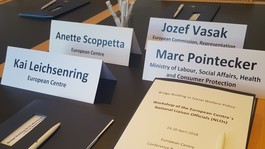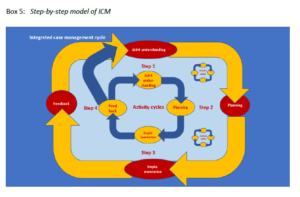Advances of Sharing Economy in Albania
By Eglantina Hysa and Alba Demneri Kruja, Epoka University
Even though the concept of sharing is relatively new to the Albanian market, Albania succeeded to make significant progress in the sharing economy, often described as available online platforms used to share access to resources, assets, and skills. In this last decade, sharing platforms were widely used by both public, private, and not for profit entities. Digitalisation, technology advancement and innovation should be the fundamental tools to develop the sharing economy. As such, the Government of Albania developed two strategies supporting innovation and platforms needed for the sharing economy. The first strategy, the National Strategy for Science, Technology, and Innovation (STI) 2009–2015, provisioned the capacity building of public and private entities with special emphasis on STI. This strategy was followed by the ‘Digital Agenda for Albania 2015–2020’ which presents a crosscutting strategy and serves to strengthen the process of innovation. Apart from governmental incentives to become an ‘e-service government,’ another important actor in the sharing economy is the municipality of Tirana. The municipality of Tirana intends to become a smart city, and its first initiative has been supported by the Chinese bike-sharing giant Mobile in 2018. The sharing economy has been predominantly introduced by globally operating firms. Following the trends in international markets, Albanian companies have become crucial drivers to innovation in the domestic market. Two sectors have been mostly influenced by the collaborative economy in Albania: agriculture and tourism.
Exploring Agriculture and Tourism Sectors
According to the Institute of Statistics (2020b), for the year 2019, around 40% of the Albanian population is registered as a labour force working in the agriculture sector. Due to its’ favourable environmental conditions and opportunities of competitiveness in European markets, this sector embodies innovative, inclusive capacities in using digital platforms, peer-to-peer (P2P) collaboration, and developed collaboration on a larger scale, including all main actors in the economy (industry-academia-government-society). However, despite its potential, few online platforms related to agriculture have been set up, such as Agroquality, or MIA.
The analysis of the sector suggests that there exist some disorders, such as lack of trust or existing corruption, and a lack of regulations in this sector. The sector is composed mostly of small-sized farms, which are rather difficult to include in a common collaborative structure. Additionally, there is a lack of a standard quality control system, which again poses some critical barriers. Although collaboration between the industry, academia, government, and society, also referred to as the quadruple helix model, is perceived as crucial for the enhancement of innovative processes, minimising the risk that entrepreneurs continuously face, especially for sustainable economic development (Kruja 2020b), it is still not fully or properly established and/or regulated. The proper existence and a functional quadruple helix model that supports the collaborative economy in agriculture would serve to solve the identification of the clients, the identification of suitable trade networks, supply segments opportunities, and market price adjustments.
The tourism sector constitutes 26.2% of Albania’s GDP (World Travel & Tourism Council 2018). Albania provides a variety of differentiated entertainment opportunities to tourists through mountain tourism, seaside tourism, historical tourism, and religious tourism. It is one of the main socio-economic resources of the country, contributing not only to job creation and employment but also to infrastructure and technological developments. Collaborative economy in the tourism sector in Albania, as in other countries, is found to be highly vibrant and relatively competitive. This is due to a globally increased demand for tourism, especially for global tourism. In this context, the digital platforms (online applications allowing participants to interact with each other) are widely used by Albanians and foreigners, for example, Albania Tourism, Albania.al, Smile Albania, and Thema Tourism App. What makes the tourism sector quite interesting is that it is characterised by two main sharing economic models. The labour market in this sector is mainly short-term contracts or freelance work, otherwise defined as ‘gig economy.’ The other economic model applied in tourism is the peer-to-peer economy, where the exchange of goods and services is directly concluded among two individuals, without the intermediation/intervention of a third party.
What’s next for Albania?
Through a synergic collaboration among the main economy’s stakeholders, actors of the value co-creation process, the collaborative economy implementation will turn back to a sustainable development process to the country, enhancing its economic, social, and environmental improvement. Thus, we highlight the importance of the quadruple helix collaboration model in order to facilitate and enhance the collaborative economy in Albania. The Albanian government should put efforts into arranging the building and implementation of functional platforms and collaborative environments by creating the proper legislative framework in line with the EU directives and processes. Concurrent, academia and research institutions should intensify the urgent obligation of supporting these advancements. The contribution of academia in technological innovation and innovative business models should be a vital part of this process. Finally, this process cannot be accomplished without society’s support of collaborative consumption. An increase of awareness and trust on reciprocal benefits of P2P consumption is decisive. The continuous communication and synergic quadruple helix supportive collaboration of these stakeholders is necessary for the fragile and crucial sectors of the sharing economy’s success in a developing country.
For a detailed analysis, you can read the chapter ‘Advances of Sharing Economy in Agriculture and Tourism Sectors of Albania’ by the same authors published as part of the book The Sharing Economy in Europe by Česnuitytė et al.







